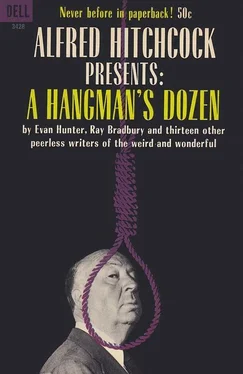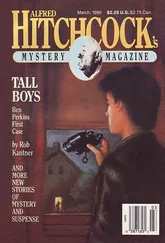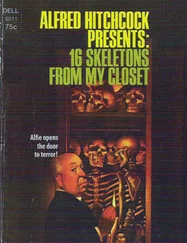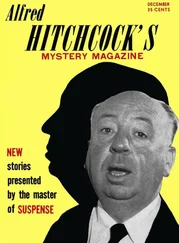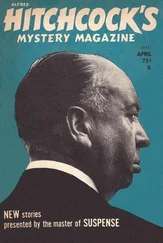Echoes. She pushed them from her mind. She had come to watch Henry Babcock take his punishment for being a good citizen.
Arnold’s voice came again. “You were standing on the sidewalk near the intersection at the time of the accident, is that right?”
Henry Babcock was merely nervous at this stage of the cross-examination. He was a rather slight man, balding, had a clean shaven face and wore thick lensed glasses that magnified his eyes owlishly. He might have been Arnold’s age, Naomi realized with a sense of incredulity. There was no other similarity. Henry Babcock looked shabby and servile. There was a natural elite, Arnold had always maintained, that was predestined to govern any society. At the moment, the validity of his theory seemed self-evident.
“Not exactly,” Henry Babcock answered. “I was sitting on a bench at the bus stop, waiting for a bus.”
“And how far was the bench from the intersection, Mr. Babcock?”
Henry Babcock hesitated. “I don’t know as I could say, exactly. Not very far.”
“Not very far.” Arnold smiled. He was always dangerous when he smiled. “That doesn’t help the jury much, does it, Mr. Babcock? Can’t you be more specific? Was it as far” — he turned slowly, his eyes sweeping the courtroom and finally coming to rest — “as from where you’re sitting to where the defendant is sitting?”
“Well, now, I don’t know—”
“Yes or no, Mr. Babcock?”
The question was like a whip. Henry Babcock straightened his glasses and sat at attention.
“Well, yes,” he said.
“The bench was the same distance from the intersection as you are from Mr. Jerome at this moment?”
“Yes, sir.”
“Very good. Now please continue and tell the jury just what happened...”
What had happened? Naomi’s mind would wander, no matter how she tried to keep it in line. Was it really as simple as Arnold had said — merely a marriage of convenience? It was difficult to believe. She knew why she’d married Arnold. She had loved him; she still loved him, in spite of what he’d become. Was she somehow responsible for that? She’d tried to be a good wife and mother; she tried to keep up with Arnold’s dazzling success...
“Mr. Babcock” — Arnold’s voice intruded on the memories again — “I want you to clarify one detail. You say that you didn’t see Agnes Thompson prior to the accident. You were sitting on the bench waiting for a bus. Mrs. Thompson approached the intersection from the east—”
Someone had set up a blackboard in view of the judge and the jury. On it was drawn the intersection with crosses indicating the location of the bench and Henry Babcock, the spot where the accident occurred, and now, at Arnold’s instruction, another cross for Mrs. Thompson approaching the intersection.
“We know that she came from the east,” Arnold continued, “because we know that she had been visiting a sick grandchild and was returning to her own home, six blocks distant, only after the grandchild had shown signs of recovery and gone to sleep. Presumably, Mrs. Thompson was weary after the strain of her vigil; presumably, she walked with a heavy tread — she was a rather heavy woman. How do you account for not hearing Mrs. Thompson approach the intersection, Mr. Babcock?”
Henry Babcock appeared puzzled. He rubbed his jaw thoughtfully with one hand, and the light glinted off the lens of his eyeglasses. The staring eyes of the jury and the courtroom seemed to bother him. The question bothered him, too.
“I didn’t say that I didn’t hear her,” he answered.
“Then you did hear her.”
“I didn’t say that, either. Maybe I heard her. I don’t remember. I was tired, too. I’d just come from work.”
“At the Century Club?”
“Yes sir. I clean up there after the place closes at two o’clock.”
“Two a.m., that is.”
“Yes, sir.”
Two a.m. It was difficult to find an accident witness in broad daylight; but when, a few days after taking the case, Arnold had received an urgent telephone call from Jerome Sr. at a similar hour of a different morning, he knew there was work ahead. It was in the downstairs hall. Arnold had just come in. He still wore his black Homburg and black topcoat over his tuxedo. Naomi had descended most of the way down the stairs, having started when she heard him come in. He took the call in silence, concluding it with a curt assurance that he would handle everything. He’d dropped the telephone back into the cradle for a moment; then took it up again and dialed.
“Fran? Arnold here. Sorry to call you now, but something’s come up. The Jerome case — a witness. Yes, the police are keeping him under wraps; but old man Jerome just got wind of it at a cocktail party and passed the word along. Now, here’s what I want you to do. Get the wheels rolling. Get everything you can on Henry Babcock. That’s right. Babcock. He’s a janitor, or porter, or some such thing at the Century Club. He was waiting for a bus to go home after work when the accident happened. I want him tabbed from the year One. You know how.”
Arnold had dropped the telephone back into the cradle and turned around. Naomi was at the bottom of the stairs by that time. He stared at her without seeming to see her at all.
“Is that who she is?” Naomi had asked. “Is it Fran, your secretary?”
Arnold’s eyebrows had a way of knitting together when he was annoyed. At that moment she hadn’t been sure whether he was more annoyed with her question or with Jerome’s call; but it was probably the latter. She didn’t even possess nuisance value any more.
“Is that who who is?” he’d asked.
“The woman you’ve been with tonight.”
She’d reached out and straightened his tie. Old-fashioned as it was, and Arnold did hate being old-fashioned about anything.
“You’re talking nonsense, Naomi. Go to bed.”
It was the way to dismiss a child. He’d stalked upstairs, his mind busy with the problem of Henry Babcock, good citizen, bent on the folly of doing his duty...
And so they were in the courtroom, and Arnold was solving his problem.
“... so, at approximately half-past three, having finished your work at the Century Club, you were sitting on a bench at the bus stop waiting for transportation to take you home. Where do you live, Mr. Babcock?”
It was an innocent question. Henry Babcock answered without hesitation.
“In Inglewood,” he said. “I’ve got a three-room apartment.”
“And do you live alone?”
“Yes, sir. Since my wife died three years ago.”
“Since your wife died,” Arnold repeated. “My sympathies, Mr. Babcock. It must be lonely, coming home to an empty apartment.”
The prosecutor stirred uneasily. He seemed to sense some ulterior motivation behind the question. Before he could object, Henry Babcock, who sensed nothing but the discomfort of the witness box, had answered.
“Yes, sir, it is,” he said.
“But you do have friends.”
“Friends?”
“At your place of employment. I believe the Century Club employs entertainers, including several very attractive young ladies. I understand that you do little favors for them, such as bringing coffee to the dressing rooms—”
The prosecutor leaped to his feet.
“Your Honor, I object to this line of questioning. We aren’t here to ascertain the witness’s sociability, or to delve into his personal life.”
Arnold turned toward him, smiling.
“And why aren’t we?” he asked. “The witness has testified in direct contradiction to the sworn statement of my client. Obviously, one of these two men is either mistaken or an outright liar. I see nothing objectionable, in attempting to establish the character of the witness. For that matter, I see nothing objectionable — although the learned prosecutor seems to differ with me on this point — in a lonely widower bringing coffee to a ladies’ dressing room.”
Читать дальше
